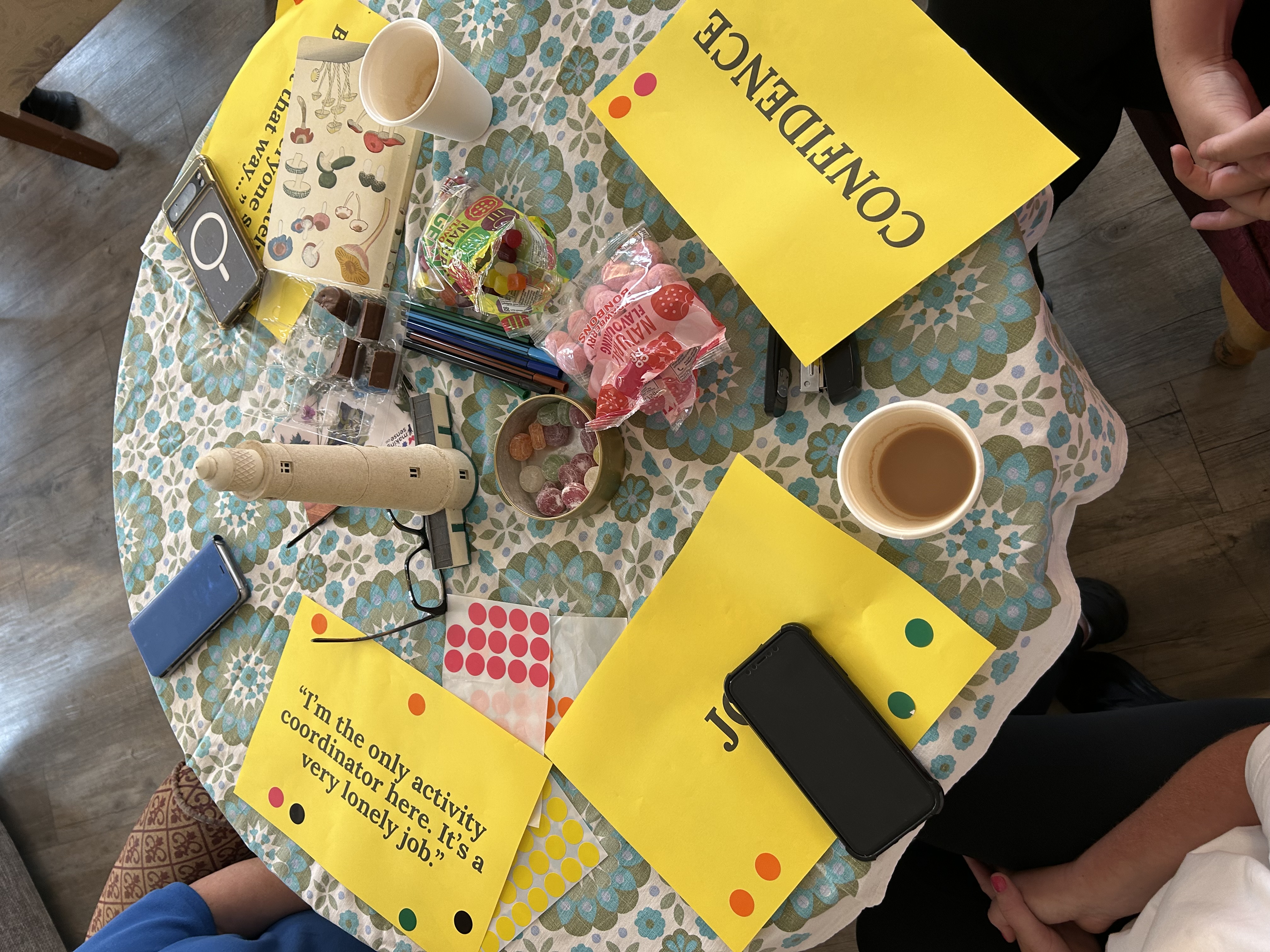Case Study: Culture in Care
Authors(s), Creator(s) and Contributors: Penny Alexander. Freelance Researcher. Making Sense CIO
Publication Date: 23/08/2025
Categories: Case Studies
Partner(s): Making Sense CIO Adult social care PCP for dementia support Referrals to care homes and activity coordinator network
Funder(s): Arts Council Wales Wrexham County Council Time in kind: Kate Evans. Person Centred Dementia Coordinator, Wrexham Local Authority
Introduction
Activity Coordinators (ACs) play a crucial role within care home settings, providing stimulating activities to benefit the wellbeing of residents. But what about the well-being of the ACs themselves? Through first-hand experience, supported by our health partner we knew they can feel isolated; their role is not always understood. We used our experience of working in the residential care sector to support ACs in Wrexham. Working with a network of 30 ACs (established by and alongside our health partner) we worked to listen, plan, then run a series of events and workshops. We explored how creativity can be embedded in care and how a creative approach can benefit the wellbeing of all staff. 3 care homes hosted residencies where artists Eleri Jones, Tara Dean and Ffion Evans worked alongside activity coordinators.
The Challenge
According to the Baring Foundation’s 2019 Older and Wiser report, a sense of purpose can be achieved in engagement in the arts. The arts can provide empowerment, personal growth, and improve individuals’ confidence and self-esteem (Gordon-Nesbitt, R, 2019). ACs are responsible for delivering activity provision in homes. ACs can lack a sense of belonging; colleagues often don’t understanding the benefits/remit of the role. This sense of isolation can impact upon the wellbeing and confidence of an AC. It also has a negative impact on staff retention. Culture in Care set out to work directly with ACs to help them gain confidence/support in their role, but also to help management and other staff to better understand their valuable contribution to the positive health outcomes for residents.
The Approach
The residencies in care homes were set up for the AC’s to work with experienced artists to develop ideas and increase their confidence in the delivery of activity provision. Residencies engaged other staff members to increase awareness of AC role/embed activity provision as a valuable resource. The workshop sessions took place in care homes. They engaged with the AC health partners in Wrexham who were recruited/invited via the care partner network. The project was developed to give us an opportunity identify what the issues impacting AC wellbeing/job satisfaction and allow us to co-produce/respond to reported needs. The project took an iterative approach with experienced artists to tailor and respond to challenges faced. Artists delivered workshops which provided a suitable environment for honest discussions and debates. Homes involved: 30 Residency sessions: 3 homes. 8 sessions each Homes: Stansty House, Broughton Hall and Chirk Court Total 60 residents and 18 staff Artist artforms: Print Making/ interactive textile making/ multidisciplinary approaches Training sessions: 5 AC training sessions. Total 50 ACs 6 artists across project Timescale: September 2024 -July 2025 Total cost: £14,904 Additional funding in kind: £1500 for time. £360 use of spaces to hold workshops/training
The Impact
There was gathered qualitative and quantitative data during the project. Residencies and workshops: Written artist reflective journals. Written AC reflective journals. AC surveys before/after residencies. Quotes/statements recorded. Note taking during conversations. Interviews: Note taking during conversations. Quotes/statements recorded Findings: ACs report feeling the following, (in order of least to most) Feeling unsupported, lacking access to materials, insufficient time to deliver, feeling undervalued, lacking confidence in their role, they enjoy their role. This demonstrates that a passion for the role and a care for the residents is what keeps many ACs motivated. Increased support could improve staff retention/motivation. Supporting the peer network was important and offered sustainability to the project; ACs wanted to continue with the format introduced by culture in care. ACs developed new skills and felt more confident in both their role and their own understanding of what activity provision means. ACs felt more connected with their peers. ACs felt nourished and recharged. Artists developed new relationships with homes/ACs. Interviews with an AC and a manager in one home offered valuable insights into the impact of activity provision.
Lessons Learned
The residencies went well; time spent working with artists was valued. The ACs gained confidence and felt supported through developing the AC network. The workshop sessions had originally included a session to work with managers but spending time with ACs demonstrated that much more foundation-building was needed with the ACs to find out what support they need. We learnt that a continuation of the project will reference learning gathered from this pilot to take to management and strengthen the project; manager buy-in is a key next step.
The Legacy
ACs who undertook a residency have continued to work with a sense of value and purpose. The network has been given more focus/structure thanks to the involvement of the project; members intend to continue this format. A manifesto was drawn up during the workshops which outlines the 10 most important factors to feel supported as an AC. The project plans to scale up beyond Wrexham to include a far broader network. An evidence-base is being developed for the project to aligned against management needs/aims.
Website and Social Media Links
https://makingsensecio.co.uk/news/
Contact Details
Ticky Lowe tickylowe@makingsensecio.co.uk
Tags: Arts activities, Care home staff, activity coordinators, Wellbeing, job retention, Care homes, Dementia

